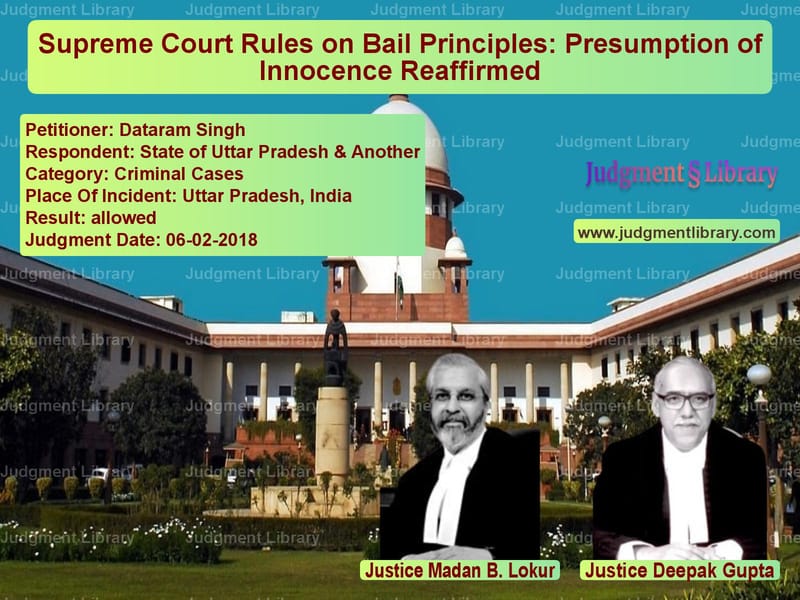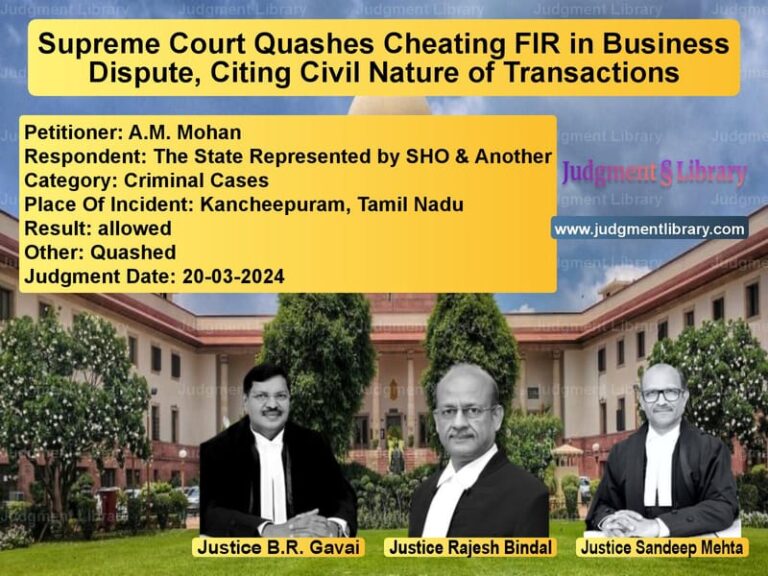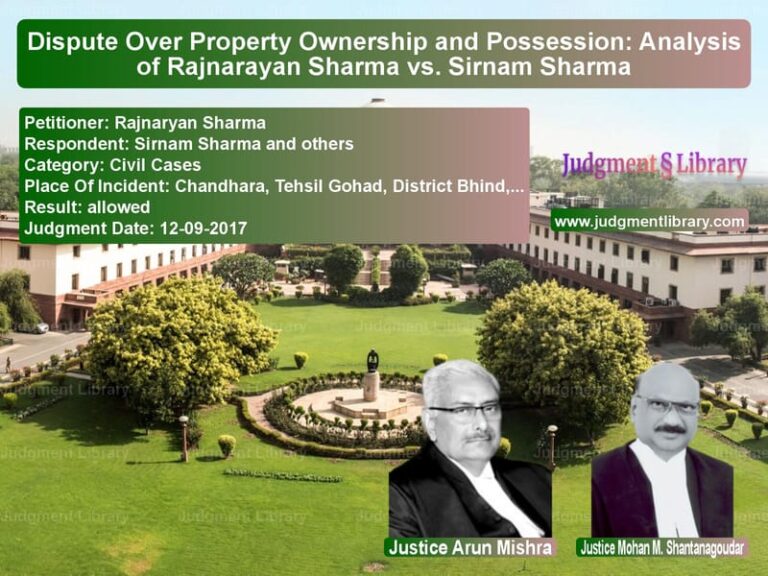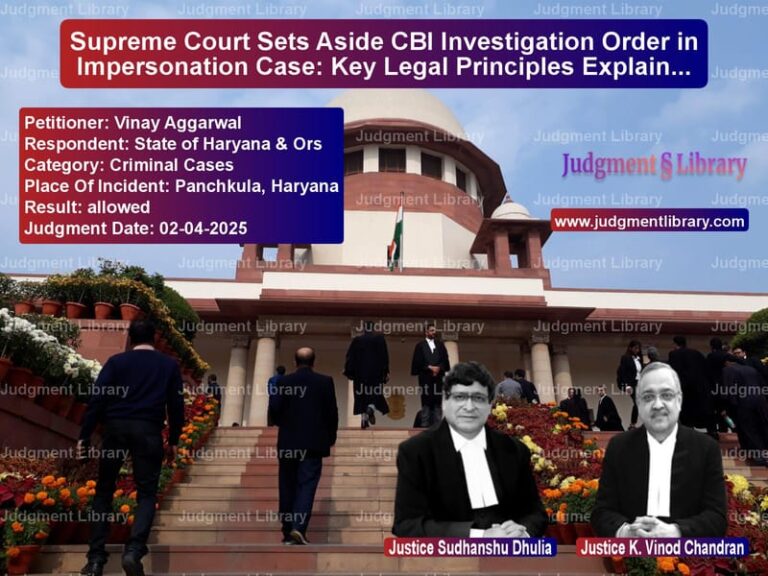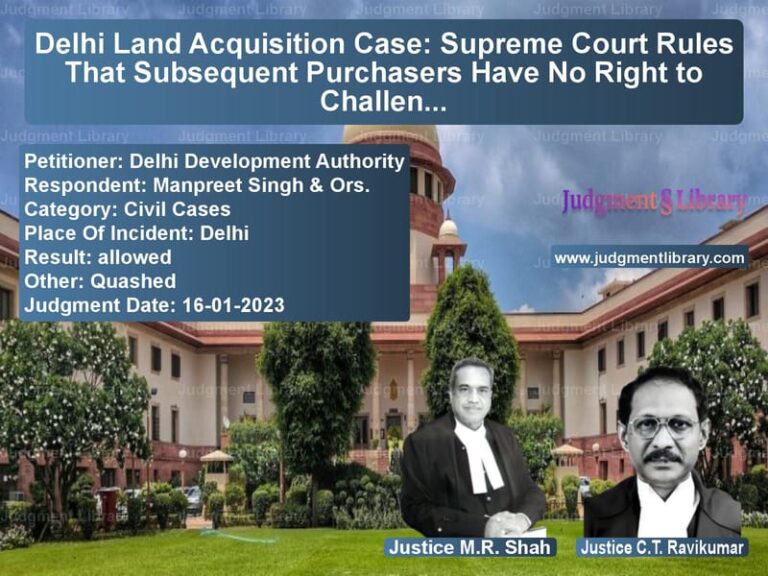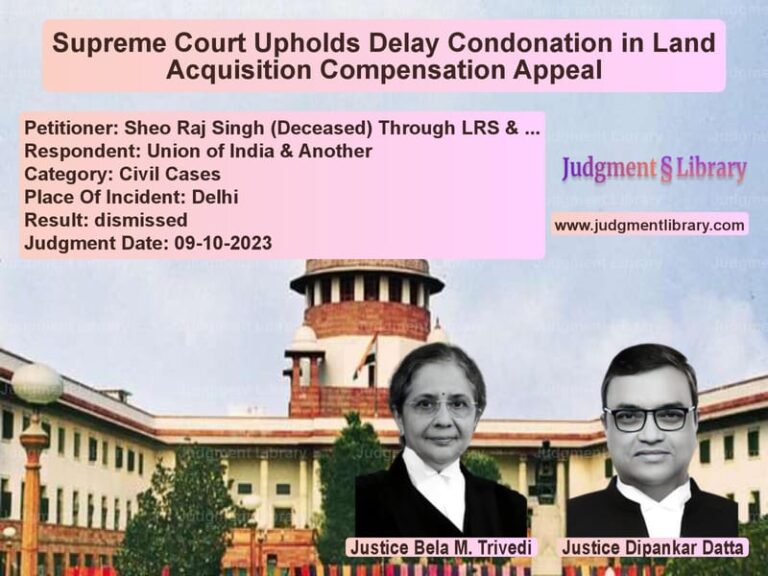Supreme Court Rules on Bail Principles: Presumption of Innocence Reaffirmed
The Supreme Court of India has delivered a crucial judgment in Dataram Singh vs. State of Uttar Pradesh & Anr., reinforcing the fundamental principle of presumption of innocence and the importance of granting bail rather than prolonged incarceration. The case revolved around the denial of bail to the appellant despite the investigating officer not finding it necessary to arrest him during the investigation stage.
The ruling sets a precedent for how courts should approach bail applications, emphasizing that bail should be the norm and imprisonment the exception. The Court also criticized the trend of unnecessarily incarcerating accused persons, leading to prison overcrowding and social injustices.
Background of the Case
The case originated from a financial dispute in which the complainant alleged that the appellant, Dataram Singh, had defrauded him of Rs. 37 lakhs. A First Information Report (FIR) was filed against the appellant on January 13, 2016, under Sections 419, 420, 406, and 506 of the Indian Penal Code. Additionally, a separate complaint was filed under Section 138 of the Negotiable Instruments Act after a cheque issued by the appellant was dishonored.
Despite the serious nature of the allegations, the investigating officer did not arrest the appellant during the investigation. However, after the charge sheet was filed, the appellant feared arrest and sought anticipatory bail from the Allahabad High Court. The High Court declined to quash the FIR but allowed him two months to appear before the trial judge. Eventually, he was taken into judicial custody on April 24, 2017.
Following his arrest, the appellant applied for bail, but his application was rejected by the trial court on April 27, 2017, and later by the Allahabad High Court on September 21, 2017. He then moved the Supreme Court, which granted him relief.
Key Legal Issues
- Whether the appellant should have been granted bail given that he was not arrested during the investigation.
- Whether lower courts exercised judicial discretion appropriately while denying bail.
- Whether the grant of bail should be the norm rather than the exception.
Arguments from Both Sides
Petitioner (Dataram Singh) Arguments
- The appellant was never arrested during the investigation stage, indicating that the police did not see him as a flight risk or a threat to witnesses.
- He had cooperated with the investigation and did not attempt to abscond.
- Despite his compliance, the trial court and High Court denied him bail, keeping him incarcerated for an extended period.
- There was no evidence suggesting that he would interfere with the trial process.
Respondents (State of Uttar Pradesh & Complainant) Arguments
- The complainant argued that the appellant had defrauded him of a significant sum of money.
- The complainant also contended that the appellant had stopped payment on the cheque given to settle the dispute, violating the Negotiable Instruments Act.
- Given the seriousness of the financial fraud, the complainant argued that bail should be denied.
Supreme Court’s Judgment
The Supreme Court strongly criticized the lower courts for denying bail to the appellant and reaffirmed key principles of criminal jurisprudence:
“A fundamental postulate of criminal jurisprudence is the presumption of innocence, meaning thereby that a person is believed to be innocent until found guilty.”
The Court also reiterated:
“The grant of bail is the general rule and putting a person in jail or in a prison or in a correction home (whichever expression one may wish to use) is an exception.”
It noted that the refusal to grant bail had resulted in unnecessary incarceration, violating the appellant’s right to personal liberty under Article 21 of the Constitution.
The Court emphasized several factors that should be considered when deciding on bail:
- If the accused was not arrested during the investigation, there should be a strong justification for placing them in custody after the charge sheet is filed.
- If the accused cooperated with the investigation, bail should not be denied arbitrarily.
- A humane approach should be taken, especially for first-time offenders and indigent individuals.
- The overcrowding of prisons should be considered, and judicial discretion should be exercised judiciously.
Consequently, the Supreme Court granted bail to the appellant and directed the trial court to impose reasonable conditions to ensure his presence during proceedings.
Key Takeaways from the Judgment
- The Supreme Court reaffirmed the presumption of innocence and the right to bail as a fundamental principle.
- The ruling discourages unnecessary incarceration, especially when an accused is cooperating with the investigation.
- The judgment provides clear guidelines for lower courts in exercising discretion on bail applications.
- The decision highlights concerns regarding prison overcrowding and the need for a humane approach to bail decisions.
Impact of the Judgment
For Accused Persons
- The ruling strengthens the right to bail and discourages unnecessary pre-trial detention.
- Accused individuals who were not arrested during the investigation can cite this judgment to seek bail.
- The decision establishes that bail conditions should not be unreasonably stringent.
For Courts
- Judges are expected to exercise discretion judiciously and avoid mechanical denials of bail.
- The ruling discourages prolonged incarceration without compelling reasons.
- The judgment serves as a guideline for balancing individual rights with the interests of justice.
Conclusion
The Supreme Court’s ruling in Dataram Singh vs. State of Uttar Pradesh is a landmark judgment reinforcing the principles of presumption of innocence and the right to bail. By emphasizing that incarceration should be the exception rather than the rule, the Court has set a strong precedent that will guide future bail applications. This decision not only upholds individual liberties but also ensures that the criminal justice system remains fair, just, and humane.
Petitioner Name: Dataram SinghRespondent Name: State of Uttar Pradesh & AnotherJudgment By: Justice Madan B. Lokur, Justice Deepak GuptaJudgment Date: 06-02-2018
Don’t miss out on the full details! Download the complete judgment in PDF format below and gain valuable insights instantly!
Download Judgment: Dataram Singh vs State of Uttar Prade Supreme Court of India Judgment Dated 06-02-2018.pdf
Direct Downlaod Judgment: Direct downlaod this Judgment
See all petitions in Bail and Anticipatory Bail
See all petitions in Fraud and Forgery
See all petitions in Judgment by Madan B. Lokur
See all petitions in Judgment by Deepak Gupta
See all petitions in allowed
See all petitions in supreme court of India judgments February 2018
See all petitions in 2018 judgments
See all posts in Criminal Cases Category
See all allowed petitions in Criminal Cases Category
See all Dismissed petitions in Criminal Cases Category
See all partially allowed petitions in Criminal Cases Category

